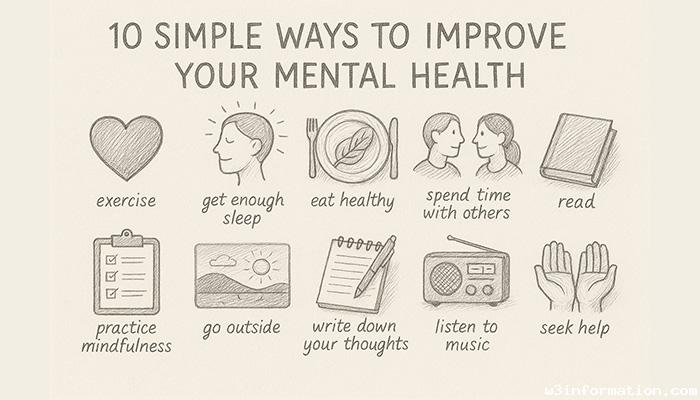10 Simple Ways to Improve Your Mental Health
Today's rapid lifestyle demands equal attention to mental health as physical health maintenance. Our ability to think and feel determines our behavior patterns and mental health is vital in how we manage stress and engage with other people. Enhancing your mental health requires straightforward and manageable steps. Implementing small and consistent changes in your routine can generate substantial improvements in your total well-being. Discover 10 straightforward methods that will help improve your mental health.
Practice Gratitude
Feeling thankful is an effective method for enhancing mental health. Daily reflection on what you appreciate helps redirect your attention from negative thoughts toward a positive perspective on life.
How to do it: Spend a few daily minutes writing down or remembering three things you feel thankful for. Things you're grateful for can vary in size but range from someone who supports you to experiencing sunshine on a beautiful day.
Why it works: Gratitude leads to increased happiness while decreasing stress and building a more profound sense of contentment.

Get Regular Exercise
Research shows that physical activity consistently contributes to improved mental well-being. Physical activity leads to decreased stress and anxiety alongside depression symptom relief which is supported by endorphin-induced mood enhancement.
How to do it: You should participate in moderate exercise for 30 minutes on most days throughout the week. Your exercise routine might include a brisk walk or activities such as cycling yoga dancing.
Why it works: Physical activity enhances your energy and sleep quality while boosting self-esteem which together help improve mental health.
Practice Mindfulness and Meditation
Meditation and mindfulness exercises provide proven benefits for stress reduction while improving concentration and emotional management. These practices enable you to remain focused on the present moment instead of dwelling on past events or worrying about future possibilities.
How to do it: Dedicate 5-10 minutes daily to deep breathing exercises or follow a guided meditation routine. Headspace and Calm provide excellent beginner resources for mindfulness training.
Why it works: Practicing mindfulness regularly helps lessen anxiety and depression symptoms while bringing about relaxation and emotional stability.
Build Healthy Relationships
Social connections are essential for mental well-being. A solid support system enables you to handle life's difficulties while providing emotional understanding and decreasing isolation feelings.
How to do it: Make time for family and friends. Whenever you find yourself in need of support reach out and focus on connections that fill your life with positivity and encouragement.
Why it works: Healthy connections supply emotional support which increases self-esteem and lessens feelings of loneliness.
Prioritize Sleep
Sleep and mental health are closely connected. When you're sleep deprived your mood becomes tense and your stress levels rise because focusing becomes harder but restorative sleep restores both your emotions and mental abilities.
How to do it: Strive to achieve 7-9 hours of restful sleep per night. Establish a calming pre-sleep routine while turning off all screens at least sixty minutes before bedtime to enhance your sleep quality.
Why it works: Adequate rest enhances brain function while also helping maintain emotional stability and stress levels which better prepares you for everyday tasks.
Eat a Balanced Diet
Your dietary choices play a crucial role in determining your emotional state and mental wellness. The optimal functioning of your brain requires a balanced diet including fruits, vegetables, whole grains and lean proteins that deliver essential nutrients.
How to do it: Make whole foods a bigger part of your nutrition plan while reducing your intake of processed products and sweet treats. Nutrient-dense foods with omega-3 fatty acids such as fish, nuts, and seeds provide significant mental health benefits.
Why it works: Consuming nutrient-dense foods helps the brain operate better by stabilizing blood sugar and supporting energy production which assists in mood regulation and anxiety reduction.
Set Realistic Goals
Achieving clear and manageable goals helps direct your path while giving you feelings of accomplishment which in turn strengthens motivation and self-assurance. Unrealistic goals create stress and feelings of inadequacy in people.
How to do it: Decompose extensive goals into smaller, practical tasks that you can handle. Maintaining motivation requires you to acknowledge your small accomplishments throughout your journey.
Why it works: When people reach their small goals they build self-esteem and discover their purpose which helps them manage stress better and feel more content.
Limit Stressful Triggers
Effective stress management plays an essential role in preserving mental well-being. Since chronic stress leads to both mental and physical health problems such as anxiety and depression it is essential to identify stress triggers and develop strategies to reduce them.
How to do it: Reduce stress by setting boundaries and delegating responsibilities while practicing deep breathing and stretching exercises during tense situations. Protect your mental health by not committing to too many tasks and ensure you take time to unwind.
Why it works: Minimizing stress decreases your chance of experiencing burnout while also enhancing your mood and general well-being.
Engage in Creative Activities
Creative expression serves as a therapeutic method to manage emotional states and enhance mental wellness. Taking part in creative hobbies such as painting, writing or playing music creates a beneficial stress release mechanism that improves mood.
How to do it: Schedule time to work on creative activities that you find enjoyable such as drawing, crafting or journaling. The primary objective should be concentrating on the activity rather than its final outcome.
Why it works: Creative activities deliver mental health benefits by offering self-expression outlets while simultaneously building relaxation and accomplishment feelings.
Seek Professional Support
Recognizing when help is needed is essential when facing mental health challenges. Talking to a therapist or counselor can give you helpful methods and techniques to enhance your mental health.
How to do it: Contact a mental health professional when you experience ongoing sadness, anxiety, or feelings of being overwhelmed. Many therapists offer virtual sessions for convenience.
Why it works: Therapy delivers emotional support along with cognitive-behavioral strategies and coping mechanisms that lead to better mental health and stronger emotional resilience.
Conclusion:
You do not need to make extreme changes or use complicated treatments to improve your mental health. Your well-being and life quality will significantly improve when you practice gratitude consistently, exercise regularly, and seek professional assistance when necessary. The path to mental health involves continual progress where each action toward self-care enhances your journey to a more fulfilling life.
 Top 10 Comfort Foods to Try This Winter
Top 10 Comfort Foods to Try This Winter
 Top 10 Christmas Destinations Around the World
Top 10 Christmas Destinations Around the World
 Navigating Adolescence: Tips for Parents and Teens
Navigating Adolescence: Tips for Parents and Teens
 How to Start a DIY Craft Project on a Budget
How to Start a DIY Craft Project on a Budget
 How to Build Strong Family Bonds in the Digital Age
How to Build Strong Family Bonds in the Digital Age
 The Importance of Early Childhood Education
The Importance of Early Childhood Education